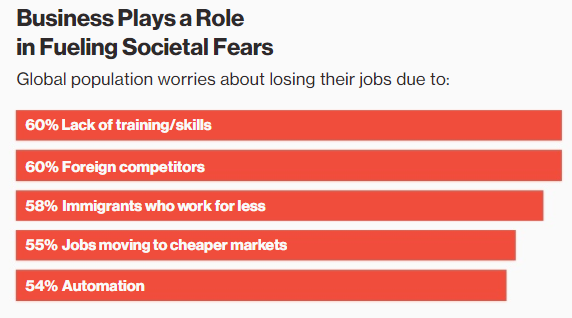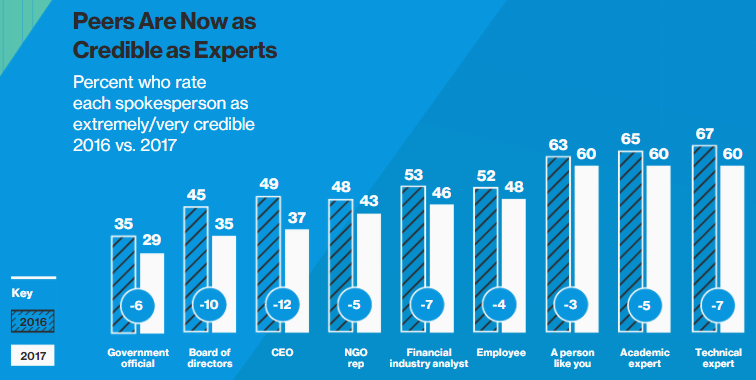
As a society and individuals, we widely distrust businesses, governments, NGOs and the media.
In fact, according to the 2017 Edelman TRUST BAROMETER, trust in these institutions to do what is right is at an all-time low.
The situation is so bad that two-thirds of the 28 countries Edelman surveyed are now considered "distrusters" and the majority of respondents lack full belief that the overall system is working for them. This climate has increased people's fears both about society and the economy. We live in a trust crisis that's causing a systemic meltdown.
Such an environment, Richard Edelman explains, leads to a rise in populist action and nationalism as the mass population wants to take control away from the "elites". From an exalted position as a savior in the wake of the financial crisis, government is viewed today as incompetent, corrupt and divided, and is the least trusted global institution at 41 percent.
What I found most interesting, though, is that business is found to be in the best position of all institutions expected to make a change and somewhat trusted to make a difference.
Three out of four respondents agree a company can take actions to both increase profits and improve economic and social conditions in the community where it operates. Moreover, among those who are uncertain about whether the system is working for them, it is business that they trust most - at 58 percent.
What makes the role of businesses (and of the other institutions) so hard, though, are the levels of the underpinning forces of corruption (40 percent), immigration (28 percent), globalization (27 percent), eroding social values (25 percent) and the pace of innovation (22 percent).
And because government, NGOs and media are seen as unable to make a change there, the expectations of businesses increase.
Business Should Foster Change But Can It?
But businesses are not necessarily meeting these expectations because they add up additional fears to the already broken system:

As much as ongoing globalization and technological change have their benefits, people believe that institutions have failed to protect them against the negative effects of these forces such as the outsourcing of jobs to lower-cost markets or the reliance on automation for lower-skilled jobs. People fear for their future of work opportunities.
The age of technology networks has made it easy for all of us to discover and consume information as well as to connect with peers across the globe, but only the ones we want to connect with. Businesses should be taking advantage of such an environment and building communities that empower employees to cultivate such relationships similarly to how influencers do so that they can exchange and grow knowledge and skills, and authentically get companies' messages out to the people.
Individuals Matter More Than Institutions
In our current reality, individuals matter more than institutions.
No wonder then that a person like yourself is now as credible as an academic or technical expert, and far more credible than a CEO or government official, implying that the primary axis of communications is now horizontal or peer-to-peer, evidence of dispersion of authority to friends and family.
As a business, your employees are your most credible sources.

But more than three-quarters of respondents among both informed and general populations agree that the system is biased against regular people and favors the rich and powerful.
The media is now also viewed as part of that "elite" distrusted group.
In fact, people favor search engines (59 percent) over human editors (41 percent) and are nearly four times more likely to ignore information that supports a position they do not believe in because technology allows them to shut out opposing points of view.
That again relates back to trust and reliance in peers for information rather than the media which on the other hand has enabled the rise of fake news and politicians directly speaking to the masses.
Media is now seen to be politicized, unable to meet its reporting obligations due to economic pressures, and following social media rather than creating the agenda.
The hierarchy of official sources has been upended:
- 64 percent of the general population say they find leaked information more believable than press statements.
- 55 percent say individuals are more believable than institutions and a company's social media page is more believable than advertising.
- spontaneous speakers are more believable than those who are rehearsed, and those who are blunt and outspoken are more believable than those who are diplomatic and polite.
What's really interesting is that respondents value personal experiences as much as, if not slightly more than, data and statistics when it comes to believability.
I think that's the most important finding that all institutions - government, businesses, NGOs and the media - must look into and learn how to become relevant through it again.
It's with the people not against, for or through them in any decision and action. I'd even add in any research or thinking about making a decision.
People want to be involved and listened to. And if done well, they will spread the world as they are the most trusted influencers nowadays.
They have the power.








